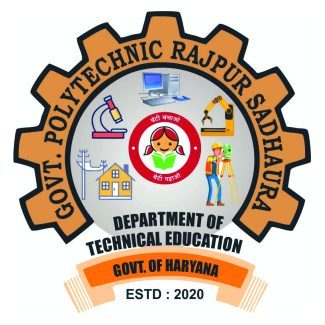Training Policy for Polytechnic Faculty/ Staff
Download Policy Document
Government Polytechnic Rajpur Sadhaura
(Approved by AICTE, New Delhi and Affiliated to HSBTE, Panchkula, Haryana)
At Government Polytechnic Rajpur Sadhaura, we believe that continuous professional development is essential for faculty members to enhance their teaching skills, stay updated with the latest advancements in their respective fields, and foster a culture of lifelong learning. The Faculty Training Policy aims to provide clear guidelines for planning, implementing, and evaluating faculty development initiatives that align with the institution’s goals of academic excellence, quality teaching, and overall institutional growth.
Objective
The primary objective of the Faculty Training Policy is to:
-
Enhance Teaching Competence: Equip faculty members with the skills and knowledge necessary to deliver high-quality education using modern and effective teaching methodologies.
-
Promote Professional Growth: Facilitate the professional development of faculty by offering opportunities for them to enhance their subject expertise, pedagogical skills, and research capabilities.
-
Adapt to Technological Advancements: Ensure that faculty members are proficient in using the latest technologies and tools that can improve the teaching-learning process.
-
Support Career Progression: Encourage faculty members to pursue training and certification programs that contribute to their academic and professional growth, aligning with the institution’s mission and objectives.
Scope
The policy applies to all teaching faculty members at Government Polytechnic Rajpur Sadhaura, regardless of their experience or academic discipline. The training programs may cover:
-
Pedagogical Training: Focused on improving teaching methods, classroom management, student engagement, and instructional design.
-
Subject-Specific Training: Focused on enhancing knowledge and skills in the faculty’s subject area, ensuring they are up-to-date with current developments and trends.
-
Technological Training: Providing faculty with training on digital tools, online platforms, and emerging technologies to incorporate them effectively into the curriculum.
-
Research and Development: Training on research methodologies, writing research papers, applying for grants, and publishing in academic journals.
-
Soft Skills Development: Training to improve communication skills, leadership abilities, time management, and interpersonal skills.
-
Administrative and Managerial Skills: Courses that focus on the administrative roles faculty may assume, such as curriculum development, project management, and accreditation processes.
Training Delivery Methods
The training programs will be delivered through a combination of the following methods:
-
Workshops and Seminars
Regular workshops and seminars will be conducted on various teaching methods, new technologies, and research skills. -
Online Training Programs
Faculty members will be encouraged to participate in online courses, webinars, and MOOC (Massive Open Online Courses) platforms for self-paced learning. -
Industry and Academic Collaborations
Collaborations with industry experts and academic institutions will be explored to organize guest lectures, joint workshops, and hands-on training sessions. -
Conferences and Symposiums
Faculty will be encouraged to attend national and international conferences, symposia, and seminars to stay abreast of the latest developments in their fields. -
In-House Training
Specialized in-house training sessions and peer group learning sessions will be conducted based on the institution’s needs and faculty feedback.
Training Needs Assessment
To ensure that the faculty training programs are relevant and effective, a Training Needs Assessment (TNA) will be conducted annually. The process will involve:
-
Self-Assessment: Faculty members will be asked to assess their training needs based on their areas of interest, subject expertise, and teaching challenges.
-
Feedback from Students: Input from students regarding the effectiveness of teaching will be analyzed to identify areas for faculty improvement.
-
Feedback from Department Heads and Academic Coordinators: Faculty development needs will be discussed at departmental and institutional levels to prioritize areas for training.
Training Plan and Implementation
The institution will develop an annual training calendar based on the results of the Training Needs Assessment, which will include:
-
Training Schedule: A detailed schedule of training programs for the year, including workshops, seminars, online courses, and conferences.
-
Resource Allocation: Adequate resources will be allocated to support faculty training, including budgets for external trainers, conference attendance, and online courses.
-
Participation Incentives: Faculty members who complete training programs successfully will be recognized and incentivized through certificates, career advancement opportunities, and financial support for attending national and international conferences.
Monitoring and Evaluation
The HR Department and IQAC (Internal Quality Assurance Cell) will monitor the progress of the training programs. Evaluation will include:
-
Feedback Surveys: Post-training feedback will be collected from participants to assess the relevance and effectiveness of each program.
-
Performance Review: The impact of training on teaching quality and faculty performance will be assessed during periodic performance reviews.
-
Continuous Improvement: Based on feedback and performance, the training policy and programs will be revised and improved for future iterations.
Benefits
The implementation of this policy will benefit faculty members by:
-
Enhancing their teaching capabilities, making them more effective educators.
-
Keeping them updated with the latest industry trends and academic developments.
-
Providing them with opportunities for career growth and professional recognition.
-
Encouraging a culture of continuous learning, contributing to the overall growth and reputation of the institution.
By adhering to this Faculty Training Policy, Government Polytechnic Rajpur Sadhaura aims to continuously improve the quality of education offered to students and foster an environment that supports both the professional and personal development of its teaching staff.





 Total Users : 8240
Total Users : 8240